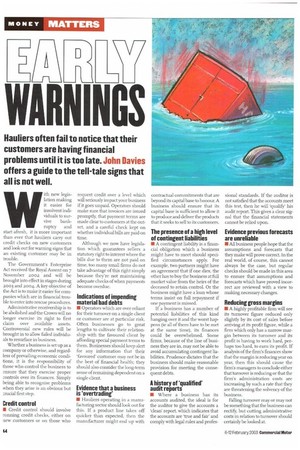WARNINGS
Page 44

If you've noticed an error in this article please click here to report it so we can fix it.
Hauliers often fail to notice that their customers are having financial problems until it is too late. John Davies offers a guide to the tell-tale signs that all is not well.
Mrith new legislation making it easier for insolvent individuals to sur vive bankruptcy and start afresh, it is more important than ever that hauliers carry out credit checks on new customers and look out for warning signs that an existing customer may be in trouble.
The Government's Enterprise Act received the Royal Assent on 7 November 2002 and will be brought into effect in stages during 2003 and 2004. A key objective of the Act is to make it easier for companies which are in financial trouble to enter into rescue procedures.
Administrative receivership is to be abolished and the Crown will no longer exercise its right to first claim over available assets. Controversial new rules will be brought in to allow failed individuals to resurface in business.
Whether a business is set up as a company or otherwise, and regardless of prevailing economic conchdons, it is the responsibility of those who control the business to ensure that they exercise proper controls over its finances. Simply being able to recognise problems when they arise is an obvious but crucial first step.
Credit control
I Credit control should involve running credit checks, either on new customers or on those who
request credit over a level which will seriously impact your business if it goes unpaid. Operators should make sure that invoices are issued promptly, that payment terms are made dear to customers at the outset, and a careful check kept on whether individual bills are paid on time.
Although we now have legislation which guarantees sellers a statutory right to interest where the bills due to them are not paid on time, too many small firms do not take advantage of this right simply because they're not maintaining adequate checks of when payments become overdue.
Indications of impending material had debts
• Operators which are over-reliant for their turnover on a single client or customer are at particular risk. Often businesses go to great lengths to cultivate their relationship with the favoured client by affording special payment terms to them. Businesses should keep alert for any information that their 'favoured customer may not be in the best of financial health; they should also consider the long-term sense of remaining dependent on a single client,
Evidence that a business is 'overtrading'
• Hauliers operating in a manufacturing sector should look out for this. If a product line takes off quicker than expected, then the manufacturer might end up with contractual commitments that are beyond its capital base to honour. A business should ensure that its capital base is sufficient to allow it to produce and deliver the products that it seeks to sell to its customers.
The presence of a high level of contingent liabilities
• A contingent liability is a financial obligation which a business might have to meet should specified circumstances apply. For example, two partners might have an agreement that if one dies, the other has to buy the business at full market value from the heirs of the deceased to retain control. Or the business might have a loan whose terms insist on full repayment if one payment is missed.
If a business has a number of potential liabilities of this kind hanging over it and the worst happens (ie all of them have to be met at the same time), its finances could be overwhelmed. Some firms, because of the line of business they are in, may not be able to avoid accumulating contingent liabilities. Prudence dictates that the business should make reasonable provision for meeting the consequent debts.
A history of 'qualified' audit reports
• Where a business has its accounts audited, the ideal is for the auditor to give the accounts a 'clean' report, which indicates that the accounts are 'true and fair' and comply with legal rules and profes sional standards. If the auditor is not satisfied that the accounts meet this test, then he will 'qualify' his audit report. This gives a clear signal that the financial statements cannot be relied upon.
Evidence previous forecasts are unreliable
• All business people hope that the assumptions and forecasts that they make will prove correct. In the real world, of course, this cannot always be the case, but regular checks should be made in this area to ensure that assumptions and forecasts which have proved incorrect are reviewed with a view to making necessary changes.
Reducing gross margins
• A highly profitable firm will see its turnover figure reduced only slightly by its cost of sales before arriving at its profit figure, while a firm which only has a narrow margin between its turnover and its profit is having to work hard, perhaps too hard, to earn its profit. If analysis of the firm's finances show that the margin is reducing year on year, then this should cause the firm's managers to conclude either that turnover is reducing or that the firm's administration costs are increasing by such a rate that they are threatening the solvency of the business.
Palling turnover may or may not be something that the business can rectify,but cutting administrative costs in relation to turnover should certainly be looked at.




























































































































































